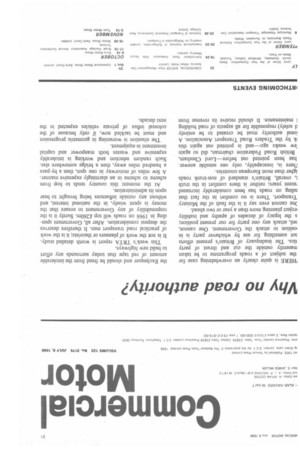Vhy no road authority?
Page 33

If you've noticed an error in this article please click here to report it so we can fix it.
'HERE is quite clearly an overwhelming case for the subject of a roads programme to be taken rnanently outside the cut and thrust of party tics. The inadequacy of Britain's present efforts riot something for use by whichever party is in position to attack the Government. One cannot, .ed, attack any one party for our present position; s the legacy of decades of apathy and inability project planning more than a year or two ahead.
)ne cannot even say it is the fault of the Ministry Transport. There is no comfort in the fact that riding on roads has been considerably increased recent years; neither is there comfort in the truth L, overall, Britain's standard of non-trunk roads igher than most European countries.
Mere is, inescapably, only one sensible answer. has been pointed out before—Lord Chesham, British Road Federation chairman, did so again 'ew weeks ago—and is pointed out again this 4( by the Traders Road Transport Association. A ional authority must be created to be entirely d solely) responsible for all aspects of road building maintenance. It should receive its revenue from the Exchequer and should be freed from the intolerable amount of red tape that today surrounds any effort to build new highways.
This week's TRTA report is worth detailed study. It is not the work of planners or theorists; it is the work of practical road transport men. It therefore deserves the deepest consideration. After all, Government spending in 1966 on roads will top £260m. Surely it is the responsibility of any Government to ensure that the money is spent wisely, in the national interest, and without any outside influences being brought to bear upon its administration.
At the moment this country tends to hop from scheme to scheme in an alarmingly expensive manner. A few miles of motorway in one spot, then a by-pass a hundred miles away, then a bridge somewhere else. Such random selection and working is intolerably expensive and wastes both manpower and capital investment in equipment.
The situation is worsening in geometric progression and must be tackled now, if only because of the colossal influx of private vehicles expected in the next decade.




























































































































